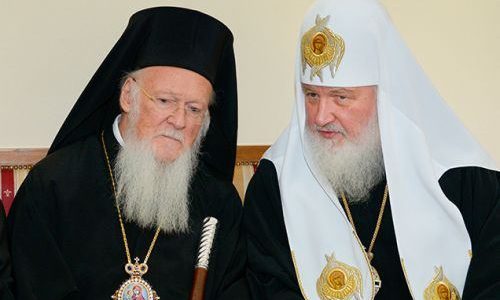By Mark Rachkevych, kyivpost.com
Russia’s decision to sever ties with the Orthodox world and its mother church came after the Ecumenical Patriarchate in Istanbul bestowed Ukraine the right to establish a fully self-governed church.
But it was a long time in the making and Moscow signaled how it would react beforehand. Veiled statements by the Russian Orthodox Church that were consistent with previous ones came on Oct. 15 on its website following a Synod, or gathering of church hierarchy, in Minsk, Belarus.
“The attempt of the Patriarchate of Constantinople (currently, Istanbul in Turkey) to decide the fate of the Ukrainian Orthodox Church (of the Moscow Patriarchate) without its consent is an anticanonical encroachment on other people’s church destinations,” the statement read on patriarchia.ru.
The move could mark a historical split between one Christian body akin to the 1054 schism that divided Western and Eastern Christianity or the Reformation in 1517, when Roman Catholicism split into new Protestant divisions.
The first solid impetus Ukraine received for Orthodox church autocephaly, or independence, came in early September when a Synaxis, or consultative meeting of hierarchs, of more than 100 metropolitans and archbishops representing 250-300 million faithful assembled in Istanbul.
At the gathering, Ecumenical Patriarch Bartholomew, known as the “first among equals” among his peers, said that his predecessor in 1686 – Patriarch Dionysios IV – under “great political pressure” was forced to give Moscow permission to ordain the metropolitan of Kyiv, thus annexing Ukraine’s Orthodox jurisdiction.
He furthermore said that the “tireless efforts on the part of our Kyivan brothers for independence from ecclesiastical control by the Moscow center. Indeed, the obstinacy of the Patriarchate of Moscow was instrumental in occasionally creating repeated mergers and restorations of ecclesiastical eparchies, uncanonical elections of bishops as well as schisms, which still afflict the pious Ukrainian people.”
Patriarch Bartholomew affirmed that Moscow doesn’t have jurisdiction over “today’s Metropolis of Kyiv” and that the “canonical dependence of Kyiv to the Mother Church of Constantinople remained constant and uninterrupted.”
Moscow canonically and politically has balked at providing Ukraine self-governed church rule ever since Filaret (Mykhailo Denysenko) broke from the Russian Orthodox Church in 1992 to head the Ukrainian Orthodox Church – Kyiv Patriarchate.
His subsequent excommunication the by Russian Orthodox Church was lifted after a three-day Ecumenical Patriarchate Synod culminated on October 11 in Istanbul, along that of Marariy Maletych’s, who heads the second of two canonically unrecognized Orthodox churches in Ukraine: the Ukrainian Auto-cephalous Orthodox Church (UAOC).
The Russian-subordinated Ukrainian Orthodox Church – Moscow Patriarchate (UOCMP) is the only one that is canonically recognized in-country.
In Minsk, the Russian Orthodox Church furthermore said that “accepting into communion the dissenters and the person anathematized in another local church with all the ‘bishops’ and ‘clerics’ ordained by them, is an encroachment on other people’s canonical destinies…all this leads the Constantinople Patriarchate beyond the canonical field and, to our great sorrow, makes it impossible for us to continue Eucharistic communion with its hierarchs, clergy and laity.”
Similar statements were made after the September synaxis when Moscow said that it would limit diplomatic and ecclesiastical ties with Istanbul, including mentioning the Ecumenical Patriarch Bartholomew’s name during divine liturgy as is customary.
“Moscow is behaving in a way that is imposing sanctions upon itself by self-isolating itself as it has done politically ever since it annexed (the Ukrainian territory of) Crimea in 2014,” Yevstratiy (Ivan) Zorya, spokesperson for the Ukraine Orthodox Church of the Kyiv Patriarchate, told the Kyiv Post at Mykhailivsky Cathedral in Kyiv on Oct. 15.
He said that up to 10 Moscow Patriarchate parishes in Ukraine have switched over to the Kyiv Patriarchate since 2014 when Moscow invaded the easternmost regions of Luhansk and Donetsk after taking over the Crimea in a war that has killed more than 10,400 people and displace an additional 1.6 million.
Some two-thirds of Ukrainians identify with the Orthodox faith and nearly half of those as parishioners of the Kyiv Patriarchate, according to a nationwide poll conducted on Aug. 30-Sept. 9 jointly by the Kyiv International Institute of Sociology, the Razumkov Center and the SOCIS Center for Social and Marketing Research; 17 percent said they identify with the Moscow Patriarchate in Ukraine.









